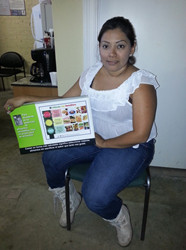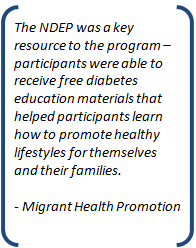What’s New RSS Feed Help with RSS
American Heart Month
Feb 01, 2013
February is American Heart Month, a great opportunity to raise awareness about what Americans can do to live heart-healthy lives. For people with diabetes, it is particularly important to take care of your heart because having diabetes means you are more likely to have a heart attack or a stroke—but it doesn’t have to. People with diabetes can take steps to lower their chances of developing heart disease and other heart problems by managing their ABCs of diabetes – A1C, Blood pressure, and Cholesterol.
Visit www.yourdiabetesinfo.org/heart for resources to help you raise awareness about the ABCs of diabetes and the link between diabetes and your heart, including a new infographic that explains why it’s important to take care of your heart if you have diabetes, and steps you can take to lower your risk for heart problems.
February Partner Spotlight
Feb 01, 2013
Background
Migrant Health Promotion (MHP) builds on community strengths to improve health in
farmworker and border communities. MHP’s programs provide peer health education,
increase access to health resources, and bring community members together with health
providers, employers, and policymakers to create positive health changes. MHP's
great work demonstrates how community leaders, called Promotores and
Promotoras,
 can provide inspiration, direction, and vision necessary to build stronger, healthier
communities.
can provide inspiration, direction, and vision necessary to build stronger, healthier
communities.
Outreach and Promotions
With support from the Texas Department of State Health Services' Diabetes Program and resources from the NDEP, Migrant Health Promotion implemented a “Promotora Community Program” (PCP) in Hidalgo County, Florida. The goal of the PCP is to promote healthy lifestyle changes by educating community members about their risk for type 2 diabetes and ways to prevent or manage the disease through healthy eating and physical activity.
As part of the PCP, Migrant Health Promotion used NDEP tools to coordinate activities
that are culturally and linguistically appropriate to the population served by MHP.
For example, the program organized cooking and nutrition classes using recipes from
NDEP’s Más que comida, es vida. (It's more than food. It's Life.) bilingual (English
 and Spanish) recipe book, teaching people how to how make traditional Mexican food
with healthier, diabetes-friendly ingredients. The program also used NDEP's bilingual
The Road to Health Toolkit and
Movimiento por su vida music CD to host diabetes
health education sessions and exercise groups focused on encouraging people to make
healthy behavior changes like eating more fruits and vegetables, reading food labels
when grocery shopping, drinking water instead of sugary drinks, and tips for making
physical activity a part of their daily lives.
and Spanish) recipe book, teaching people how to how make traditional Mexican food
with healthier, diabetes-friendly ingredients. The program also used NDEP's bilingual
The Road to Health Toolkit and
Movimiento por su vida music CD to host diabetes
health education sessions and exercise groups focused on encouraging people to make
healthy behavior changes like eating more fruits and vegetables, reading food labels
when grocery shopping, drinking water instead of sugary drinks, and tips for making
physical activity a part of their daily lives.
As of August 2012, MHP conducted more than 100 sessions with a total of more than 1,500 program participants. Participants reported that their knowledge of diabetes and the importance of healthy eating and physical activity increased, noting that they have started making better food choices and being more active. One participant added, "If it wasn't for the PCP, I would have never made the time to exercise. Since I have joined the exercise group, I feel more motivated, more energetic, and agile."
For more information about Migrant Health Promotion and the Promotora Community Program, visit www.migranthealth.org or contact Colleen Reinert at creinert@migranthealth.org.
January Partner Spotlight
Jan 04, 2013
Background
Newton Medical Center (NMC) is a not-for-profit facility dedicated to providing health care services to residents of Harvey, Kansas and surrounding counties, regardless of race, color, sex, age, religion or ability to pay. In support of National Diabetes Month 2012, NMC partnered with community organizations and the NDEP to raise awareness of diabetes and the importance of making lifestyle changes to prevent type 2 diabetes or manage the disease to prevent complications.
Outreach and Promotions
Newton Medical Center and supporting partners sponsored several events during November to promote the theme, “Give Thanks! I Can Help Prevent Diabetes in Myself.”
 To kick off the month, NMC hosted Dinner with the Doctor, a diabetes prevention
panel discussion open to the general public that featured presentations by a family
practice physician, obstetrician/gynecologist, and Certified Diabetes Educator (CDE).
In addition to enjoying a diabetes-friendly dinner, attendees were able to ask questions
about type 2 diabetes prevention and receive educational materials. During the event,
NMC distributed NDEP’s
Prevent Type 2 Diabetes. Step by Step.,
More than 50 Ways
to Prevent Diabetes, and
It’s Never Too Early to Prevent Diabetes tip sheets.
To kick off the month, NMC hosted Dinner with the Doctor, a diabetes prevention
panel discussion open to the general public that featured presentations by a family
practice physician, obstetrician/gynecologist, and Certified Diabetes Educator (CDE).
In addition to enjoying a diabetes-friendly dinner, attendees were able to ask questions
about type 2 diabetes prevention and receive educational materials. During the event,
NMC distributed NDEP’s
Prevent Type 2 Diabetes. Step by Step.,
More than 50 Ways
to Prevent Diabetes, and
It’s Never Too Early to Prevent Diabetes tip sheets.
Newton Medical Center Primary Care Clinic employees led two “walkabouts” throughout the month to encourage regular exercise. Clinic employees invited the area’s Chambers of Commerce, as well as city leaders, community members, and the local elementary school to join the walks at a local park. A number of hospital employees also led walkabouts along hospital walking paths. Participants received the NDEP’s Small Steps. Big Rewards. Your GAME PLAN to Prevent Type 2 Diabetes booklet as a prize. Children also received NDEP’s Tips for Kids: How to Lower Your Risk for Type 2 Diabetes.
To follow up on this effort, NMC arranged to have CDEs give a presentation to the Chambers of Commerce titled, “Fifteen Minutes to Effective Carb Counting – Help Prevent the Onset of Diabetes” and distributed NDEP’s More than 50 Ways to Prevent Diabetes tip sheet.
Newton Medical Center also coordinated roundtable discussions with doctors and CDEs targeting patients at risk for type 2 diabetes. Doctors mailed their at-risk patients personal letters inviting them to join the roundtable discussions to talk about steps they can take to prevent type 2 diabetes or manage it to prevent complications. To guide the discussions, doctors used NDEP’s Prevent Type 2 Diabetes. Step by Step. tip sheet and The Road to Health Toolkit.
Additional activities during the month included healthy cooking classes hosted by dietitians, and collaborations with other health care facilities, ministries, and community organizations to distribute NDEP materials to at-risk audiences.
Newton Medical Center promoted National Diabetes Month events via the NMC website, electronic signs at the hospital and along the highway, posters in the hospital lobbies, and local media using resources from NDEP’s National Diabetes Month promotional toolkit.
For more information, contact Vallerie Gleason at val.gleason@newmedctr.org.
New Year’s Resolutions
Dec 14, 2012
 January is the start of a new year and a time when many people make New Year’s resolutions to be healthier. Maintaining a healthy weight and staying active can help prevent a number of chronic diseases, including type 2 diabetes. Small changes – such as losing a small amount of weight and becoming more active – can go a long way toward a healthier lifestyle. But even if people know what to do, figuring out how to do it and fitting it into their daily routine can be a challenge.
January is the start of a new year and a time when many people make New Year’s resolutions to be healthier. Maintaining a healthy weight and staying active can help prevent a number of chronic diseases, including type 2 diabetes. Small changes – such as losing a small amount of weight and becoming more active – can go a long way toward a healthier lifestyle. But even if people know what to do, figuring out how to do it and fitting it into their daily routine can be a challenge.
Change begins with just one step. This New Year, encourage people take the first step toward a healthier life with NDEP’s Just One Step tool. The tool will help them take the first of many small steps that can lead to big rewards. The tool will help people think about:
- what step they will take to help reach their goal (for example, walking),
- when and how often they will do it (for example, go walking on Monday, Tuesday, and Wednesday during the lunch hour), and
- how much time they will put into their step (for example, walk 15 minutes each day to start).
Once they have taken the first few steps, people may need help making these changes stick as part of a daily routine. Making a plan can make this much easier. The NDEP’s Make a Plan tool can help people think about what is important to their health and how to make a plan to take small, but important steps to help them reach their goal.
The key to reaching health goals – and keeping up resolutions all year long – is to set a goal and make a step by step plan. Encourage people to resolve to take the first step at YourDiabetesInfo.org/JustOneStep, then check out YourDiabetesInfo.org/MakeAPlan.
2012 NDEP Frankie Award Winners
Nov 29, 2012
NDEP is pleased to announce the winners of the 2012 Frankie Awards. The Frankie Awards recognize the innovative and effective use and promotion of NDEP materials and resources as the cornerstone of diabetes prevention and control programs and initiatives. They are named in honor of Frank Vinicor, M.D., former director of the Center for Disease Control and Prevention’s (CDC’s) Division of Diabetes Translation (DDT) and a founder of the National Diabetes Education Program (NDEP). All state Diabetes Prevention and Control Programs, organizations, and public or private partners who used NDEP resources to develop prevention and/or control initiatives or incorporated NDEP materials into existing activities between January 2011 and December 2011 were eligible to apply. The Frank Vinicor Award of Excellence recognizes exemplary use or adaptation of NDEP resources in a comprehensive, multifaceted campaign to address behavior change. It is selected from among the winners in the four categories.
Award Winners
Frank Vinicor Award of Excellence
Minnesota Department of Health
Minnesota Diabetes & Heart Health Collaborative Health Literacy Flip Chart
Minnesota has seen explosive growth in the number of residents whose primary language is not English, fuelling already high health disparities. The Minnesota Diabetes and Heart Health Collaborative (MN-DC), a partnership between 17 leading health care organizations, responded to these trends by developing a low literacy patient handout using pictures and a few words (in English, Spanish and Somali) to describe 13 essential self-care activities based on NDEP’s “4 Steps to Control Your Diabetes. For Life.” The flip chart was designed for use with non-English-speaking people, recent immigrants, the deaf and hard of hearing, the elderly, and anyone else struggling to manage their pre-existing diabetes due to low health literacy.
The MN-DC expanded the handout into a scripted flip chart for use by health professionals and lay health educators. The purpose of the flip chart, entitled “Control Your Diabetes for Life!,” was to help people with poor health literacy better understand how to control their diabetes, why it is so important, and where to get help. Our diverse pool of users continue to ask for more – more flip charts, more topics covered in a similar fashion, more translations to the scripted portions, and more goal-setting aids. In 2011, the MN-DC moved to an online version of the flip chart in order to greatly expand the content. The new online materials, introduced in late 2011 and covering 24 topics, additionally drew on content from NDEP’s “Learn About Diabetes,” “Take Care of Your Heart. Manage Your Diabetes” and “Know Your Diabetes ABCs.” More topics are being planned, and NDEP will remain a key source. Flip chart users also asked for, and got, a goal-setting handout that the educator could help the patient complete. We added behavior change tips for the educator, based in part on information in NEDP’s “Diabetes HealthSense.”
Nearly 1,000 flip charts were distributed to health professionals, lay educators, CHWs and nursing instructors, community centers and others. Ten clinics initially piloted the flip chart with over 50 patients. All users found the tool to be effective and all patients said it was helpful.
More information about the flip chart, as well as the complete tool set can be found at http://www.mn-dc.org/literacy.html
Collaborative Partnership Using NDEP Resources
U.S. Preventive Medicine
Macaw Mobile Manager for Diabetes
The purpose of the program was to collaborate on the development of an innovative mobile smartphone application to support diabetes self-management and well-being. The program goal was to develop a smartphone application to support diabetes self-management using NDEP content and resources in conjunction with guidance from NDEP content experts. We started by convening a multidisciplinary panel of experts in diabetes care to direct the content and structure of the mobile application. These experts directed the use of online resources to develop the notifications, schedule of screenings, self-care tasks and assessment questions so that we could create a Diabetes Well-being Score. As a user interacts with the mobile application and completes various tasks, their score increases. Users will be provided daily reminders in the form of a diabetes diary that compiles all the various activities due that day. For instance, the user may have to complete an appointment with their podiatrist, track their glucose and nutrition for the day and indicate that they have taken their medications to complete their activities and thereby increasing their Diabetes Well-being Score.
The team utilized many different publications from the NDEP website in the creation of the program content, trackers, score and self-care tasks. Each publication was referenced and linked to the NDEP site within the application so that the user can read more about that particular topic. Examples of materials used to create the application include: Women and Diabetes, When Your Blood Glucose Is Too High or Too Low, Tips to Help You Stay Healthy, Diabetes Numbers at a Glance, For A Healthy Heart, Control the ABC’s of Diabetes and Be Sweet to Your Feet.
The mobile manager for diabetes has not yet been deployed in a population so that efficacy and impact on hemoglobin A1C or fasting glucose can be measured. However, U.S. Preventive Medicine will conduct several pilot studies to evaluate the effectiveness of the USPM Macaw Mobile Manager for Diabetes.
Promotion of NDEP Resources to Address Disparities
Lake County Tribal Health - Diabetes Prevention Program
Learning to Live in Balance Diabetes Prevention Program
The goal of our “Learning to Live in Balance” 16-week Diabetes prevention classes is to help our low socio-economic population lose 7% of their body weight through healthy eating and exercise. The “Learning to Live in Balance” program has demonstrated the ability to assist participants with preventing or delaying type 2 Diabetes in our rural Native American communities of Lake County. The health behaviors addressed by our program include poor diet and nutrition learned behaviors, lack of physical activity due to little or no motivation, and declining health indicative of Pre-Diabetes. Through our program, patients are encouraged to lose and maintain weight loss by making healthy food choices and increasing physical activity. Patients are taught through a variety of means that include food demos, low-fat recipes that promote intake of vegetables, fruits, whole grains, and legumes in their diet (the three sister combo). Patients are also encouraged to engage in moderate physical activity for at least 150 minutes per week.
An essential resource tool we have incorporated into our program is the National Diabetes Education Program’s “The Road to Health Toolkit.” Our Diabetes Prevention Support Team has studied the training guide and frequently uses the material in their presentations to program participants. The most popular tool used is the GAME PLAN Food and Activity Tracker that we have adapted to assist our participants with recording food, drink and physical activity. The adapted food and activity tracker is user friendly and has helped even our most reluctant participants feel comfortable with beginning to track. What we appreciate about “The Road to Health Toolkit” material most is that it was developed with health literacy in mind. The materials are not too cumbersome and gradually guide participants through learning to change their lifestyle.
Patients have demonstrated significant improvements in weight loss, decrease in blood pressure, healthier ranges of lipid levels and an increase in regular physical activity. More significantly, participants have considerably reduced their HgbA1C which has decreased the incidences of newly diagnosed diabetics among Native prediabetics in Lake County. Our participants leave our “Learning to Live in Balance” Diabetes Prevention Program with an increased knowledge of how to live a healthier lifestyle, feel better, and more importantly, leave empowered to take control of their own health.
Implementation of an NDEP Program or Activity in the Community
San Juan Basin Health Department
Promoviendo la Salud
Promoviendo la Salud (PLS) was designed to screen for chronic disease presence and to educate clients if diabetes was a potential risk or already present. If risk factors were ascertained via lab results, clients were educated along with their friends and families (often in their own homes) by a trained bilingual, bicultural community health worker (promotora). Promoviendo offered Latino adults in two Southwest Colorado counties affordable, culturally sensitive opportunities to engage in preventive healthcare activities and access to health information. The educational sessions (“platicas”) promoted healthy lifestyles, including diet, exercise, and preventive health maintenance (pap smears, self breast exams, etc.). Via the health screenings, clients increased awareness regarding their health status, and received counseling and support to prevent the long-term health problems associated with elevated blood glucose, cholesterol, BMI and blood pressure.
Two promotoras, one in La Plata County and one in Archuleta County completed the NDEP online course intended to teach diabetes educators how to use the “Road to Health Toolkit.” The toolkit which promotes diabetes prevention through lifestyle changes provided excellent companion pieces to the promotoras’ education outreach campaign for Latinos. The toolkit was put to use right away with the promotora’s group platicas and in individual counseling sessions with high-risk clients to discuss lab results. The toolkit materials helped explain key education pieces about diabetes and were excellent resources to help motivate clients toward increased health by fostering healthier eating habits such as choosing appropriate foods at the market, managing portion control and carb counting. The visual aids lent an important experiential component to address adult learning styles. The toolkit was particularly effective for the Latino community including the music CD a promotora utilized for Zumba exercise demonstrations.
In reviewing the overarching goals of the program, the identified disparate populations of Latinos had improved their health status as evidenced the results of client surveys and interviews. The second goal of increasing capacity among providers to serve disparate populations was partially realized in that numerous partners in both counties served on an Advisory Board and became well educated as to the barriers that needed to be addressed. The hospital in La Plata County now has a bilingual patient advocate/navigator and a community clinic is set to open this fall. Archuleta County also has bilingual staff at their community clinic and offers a sliding scale fee. Some of these outcomes also speak to the third goal of increasing community support for policies that improve access to primary and preventive care, and a strengthened safety net for underserved Latino adults in Southwest Colorado.
Use of Media
National Kidney Foundation of Michigan
Communities Against Diabetes
There is a high burden of unmet economic, social, and health support needs in the predominantly African American populations of Flint, NW Detroit, and Inkster, MI. The National Kidney Foundation of Michigan (NKFM), with support from the Centers for Disease Control and Prevention (CDC), aims to reduce morbidity and premature mortality and eliminate health disparities associated with diabetes in these three communities. One of the project’s key objectives is to raise awareness of diabetes and its related complications. By using the National Diabetes Education Program (NDEP) materials and messages in local community centers, health clinics, and housing complexes, as well as in print, radio, and social media outlets, we hope to infuse the community with information and resources to better manage diabetes.
With the help of multiple partner organizations, we used creative strategies to deliver NDEP materials and messages to meet the unique needs of the communities. For example, NDEP’s managing diabetes posters were adapted to connect with the hard-to-reach community members with a photo of a local resident along with their story and message about managing diabetes. These posters were displayed at community locations, and on Facebook pages. Also, NDEP’s Tasty Recipes cookbook, recipe cards, and posters were distributed at cooking classes, restaurant events, grocery store tours, and farmers markets to provide tools to eating a healthy, diabetes friendly diet. Dozens of NDEP campaigns, messages, and materials were implemented over the course of this project. To maintain consistency, we implemented a targeted campaign using the phrase “Control Your ABCs” to raise awareness across the 3 at-risk communities. The ABCs message was tagged onto all messages, tweets, Facebook posts, and press releases. Multiple community organizations and businesses have embraced the NDEP posters and materials and have committed to making them prominently visible to their patrons and guests.
Over 40 partner organizations regularly distribute printed NDEP materials through their organization - to patients at free clinics, at local grocery stores, fitness organizations, restaurants, and local businesses. Social media has been another very successful way to distribute NDEP messages to community members and organizations. Each coalition has a Facebook page to share information and NDEP messages. Combined, the coalition Facebook pages have nearly 200 fans and over 14,000 view posts in the last year. The NKFM Twitter page has 485 followers, which has nearly quadrupled in the last year. It is estimated that NDEP messages have reached up to 55,000 Twitter users. Several diabetes-related messages were re-tweeted 108 times by other Twitter users, reaching 155,000 people. In addition, over 55 newspaper articles were printed in the last year, reaching an estimated 386,300 readers. As part of the Diabetes ABCs Campaign, a radio commercial as well as public service announcements and digital advertisements were aired in the communities (with a reach of 648,000 adults on air, plus 78,729 monthly streaming and mobile visitors). There were also three television interviews on metro-Detroit outlets. Two interviews that appeared on the local CBS station discussed fighting diabetes in Southeast Michigan, and an interview on another local station talked about fitness and diabetes management. Television interviews aired in the community to raise awareness of the importance of managing diabetes.
NDEP would like to acknowledge this year’s judges: Pamela Geis, Carol Mallette, and Brenda Ralls. The work of the judges was instrumental in selecting programs to recognize from among the many high quality submissions received this year. NDEP is grateful for the support and dedication of all its partners in promoting and using NDEP resources.
